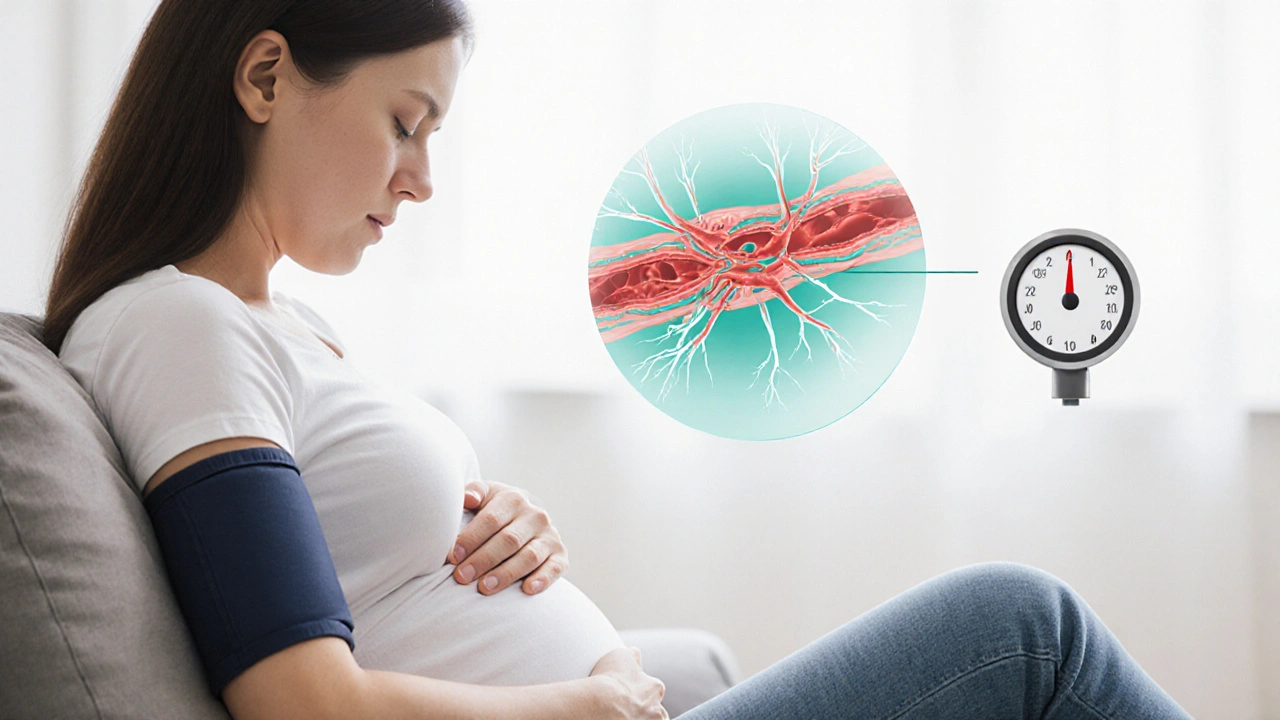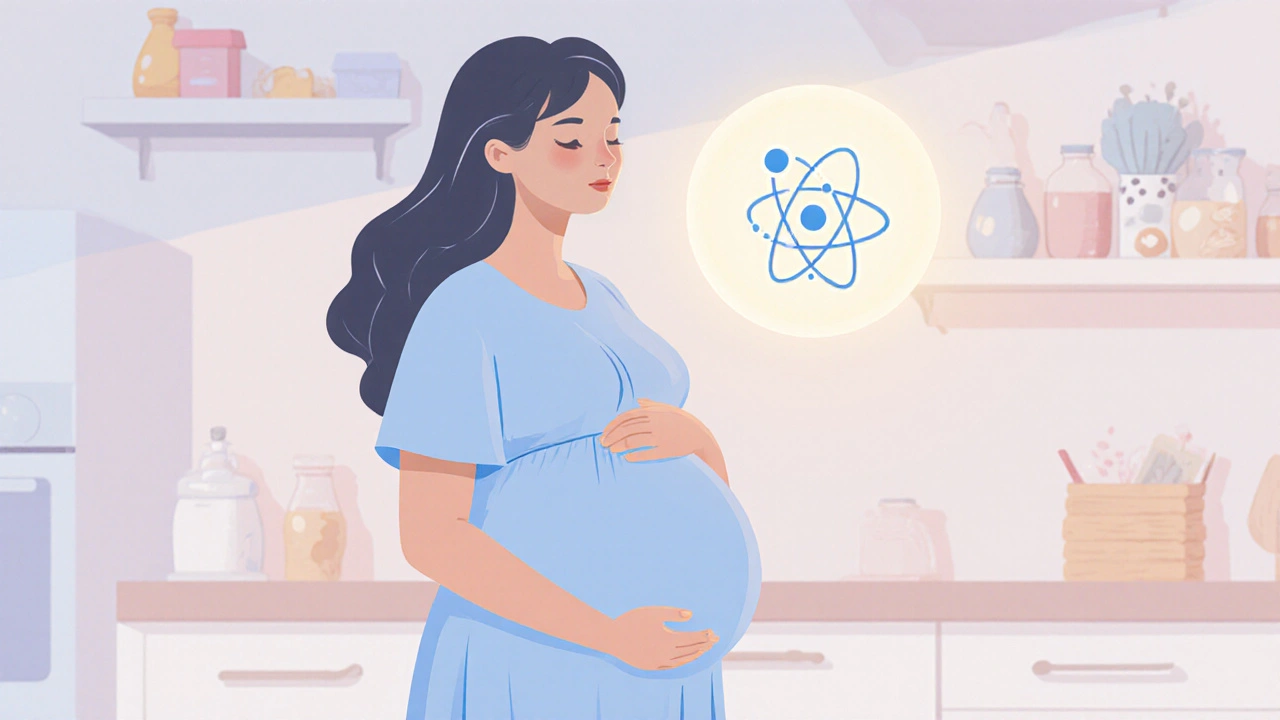When you’re expecting, the word "deficiency" instantly raises alarm bells. Low calcium a mineral that builds and maintains strong bones and supports nerve function can feel like a tiny detail, but it ripples through both mom and baby in surprising ways. Below you’ll find the risks, the warning signs, and a step‑by‑step plan to keep those calcium levels in the sweet spot throughout pregnancy.
- Calcium deficiency can trigger high blood pressure, preeclampsia, and weaker fetal bones.
- Daily needs jump to about 1,000mg during pregnancy, almost double the average adult intake.
- Food first: dairy, leafy greens, fortified plant milks, and fish with soft bones are powerhouse sources.
- If diet falls short, prenatal calcium supplements safely bridge the gap.
- Regular blood‑calcium checks help catch problems before they become emergencies.
What Is Calcium Deficiency During Pregnancy?
Medical professionals define calcium deficiency a condition where blood calcium levels dip below the normal range, typically under 8.5mg/dL as a shortage of usable calcium in the bloodstream. During pregnancy the nine‑month period when a fertilized egg develops into a baby inside the uterus, the mother’s body redirects calcium to the growing fetus, especially in the third trimester. If the mother’s diet or stores can’t keep up, the body pulls calcium from her own bones, weakening them and raising the risk of complications.
Why Calcium Matters for Mom and Baby
Calcium isn’t just about strong teeth. It plays three crucial roles during pregnancy:
- Fetal bone development: A baby’s skeleton gains most of its mineral mass in the last 12weeks. Without enough calcium, the baby may start life with lower bone density.
- Maternal blood pressure regulation: Calcium helps blood vessels contract and relax. Low levels are linked to hypertension and preeclampsia a pregnancy‑specific disorder marked by high blood pressure and organ damage.
- Muscle and nerve function: From heartbeats to uterine contractions, calcium ions are the messengers that keep everything moving smoothly.
Common Risks & Complications
When calcium is scarce, the following issues tend to surface:
- Hypertension and preeclampsia: Studies in New Zealand and Australia show that women who meet the 1,000mg daily calcium target reduce preeclampsia rates by up to 30%.
- Gestational osteoporosis: Although rare, severe deficiency can lead to osteoporosis a condition where bones become porous and fragile, causing back pain and reduced mobility.
- Low birth weight and compromised bone health: Babies may be born lighter and with lower bone mineral content, which can affect growth trajectories.
- Dental problems for mom: Calcium loss can make teeth more prone to decay and gum disease, especially when morning sickness limits oral hygiene.
How to Spot the Signs Early
Symptoms of calcium deficiency are often subtle, but they’re worth noticing:
- Tingling or numbness in fingers and toes.
- Muscle cramps, especially at night.
- Persistent fatigue that isn’t explained by normal pregnancy tiredness.
- Bone or joint aches without a clear injury.
If any of these pop up, ask your midwife or GP for a simple blood‑calcium test. The result will guide whether you need dietary tweaks or a supplement.

Nutrition Strategies to Prevent Deficiency
Food is the first line of defense. Aim for about 1,000mg of calcium each day. Below is a handy chart that breaks down the calcium content of everyday options.
| Food | Serving Size | Calcium (mg) |
|---|---|---|
| Milk (whole) | 1 cup (240ml) | 300 |
| Yogurt (plain, low‑fat) | 1 cup | 350 |
| Cheddar cheese | 1 ounce (28g) | 200 |
| Broccoli (cooked) | 1 cup | 180 |
| Almonds | 1 ounce (23 nuts) | 75 |
| Sardines (with bones) | 3oz (85g) | 325 |
| Fortified soy milk | 1 cup | 300 |
| Tofu (calcium‑set) | ½ cup | 250 |
Notice the variety: dairy, leafy greens, nuts, and fish all contribute. If you’re lactose intolerant or vegan, the fortified plant milks and tofu become your go‑to sources.
When Supplements Are Needed
Even with a balanced plate, some mothers still fall short-especially those with limited appetite, morning sickness, or dietary restrictions. A well‑formulated prenatal supplement a vitamin/mineral product designed for pregnancy, often containing 200-300mg of calcium per tablet can safely fill the gap.
Key points for choosing a supplement:
- Look for calcium carbonate or calcium citrate combined with vitaminD the fat‑soluble vitamin that enhances calcium absorption in the gut. Aim for 400-600IU of vitaminD per day.
- Check that the product is certified for pregnancy (e.g., by the New Zealand Medicines and Medical Devices Safety Authority).
- Split the dose into two smaller servings if you experience stomach upset.
Always run the supplement plan by your health provider, especially if you have kidney issues or are on medication that interacts with calcium.
Lifestyle Tips & Safe Sources
Beyond food and pills, a few everyday habits keep calcium where it belongs:
- Stay active: Weight‑bearing exercises like walking, prenatal yoga, or light resistance training stimulate bone formation.
- Limit soda and caffeine: High intake can increase calcium excretion.
- Get sunlight: Ten minutes of moderate sun daily boosts vitaminD, which in turn improves calcium uptake.
- Avoid smoking and excessive alcohol: Both interfere with bone health.
For moms with gestational diabetes, pay extra attention to dairy choices that are low in added sugar.
Quick Checklist for Expectant Moms
- Track daily calcium intake (aim≥1,000mg).
- Include at least two calcium‑rich foods at each meal.
- Ask for a blood‑calcium test at the 20‑week scan.
- Discuss supplement dosage with your midwife if you’re pregnant in the later stages of gestation and feel fatigued.
- Stay active for 30minutes most days.
- Monitor for tingling, cramps, or unusual fatigue and report them promptly.

Frequently Asked Questions
How much calcium do I need each day when pregnant?
The recommended intake is about 1,000mg per day for most pregnant women. This can be met through a combination of dairy, fortified foods, and, if needed, a prenatal supplement.
Can I get enough calcium on a vegan diet?
Yes. Fortified plant milks, tofu set with calcium sulfate, almonds, and leafy greens like kale can together provide the needed amount. Pair them with vitaminD to boost absorption.
Is calcium deficiency linked to preeclampsia?
Research shows that adequate calcium intake (≈1,000mg daily) can lower the risk of preeclampsia by up to 30%, especially in populations with traditionally low calcium diets.
Should I take calcium supplements with my prenatal vitamins?
Many prenatal vitamins already contain 200-300mg of calcium. If your total dietary intake is low, an additional calcium‑only supplement can be safe, but always check the combined total with your healthcare provider.
What are the symptoms of low calcium during pregnancy?
Common signs include tingling in the hands or feet, frequent muscle cramps, unusual fatigue, and bone or joint aches not linked to normal pregnancy strain.


Hey there! Diving into calcium during pregnancy is a smart move, and the basics are pretty easy to grab. Think of dairy, leafy greens, and fortified milks as your daily allies – they pack a serious calcium punch. If you’re lactose‑intolerant, tofu and almonds can step in without missing a beat. Pair those foods with a splash of sunlight for vitamin D, and you’ll help your body absorb the mineral more efficiently. Keep an eye on those tingling fingers; they’re your body’s quiet reminder to stay topped up.
Calcium, as an elemental cornerstone of skeletal architecture, occupies a privileged position within the pantheon of prenatal nutrition, and its scarcity can, in the most eloquent of terms, orchestrate a cascade of physiological perturbations that extend far beyond the obvious osteoporotic concerns. First, the maternal circulatory system, when deprived of adequate calcium, tends to compensate by augmenting systemic vascular resistance, a maneuver that inadvertently sets the stage for hypertensive disorders. Second, the fetal skeletal matrix, reliant upon a steady flux of calcium ions, may find its mineralization trajectory subtly derailed, resulting in a neonatal phenotype that bears the imprint of reduced bone density. Third, the neuro‑muscular conduit, which choreographs uterine contractions and cardiac rhythm alike, suffers from diminished excitability when calcium reserves wane, thus inviting episodes of inexplicable muscle cramps and fatigue. Moreover, the interplay between calcium and vitamin D constitutes a synergistic duet, wherein the latter serves as the catalytic cofactor that shepherds calcium across the intestinal epithelium. In practical terms, a diet that incorporates at least one serving of dairy, such as a cup of milk, or its plant‑based equivalent, provides approximately three hundred milligrams of calcium, a figure that, when multiplied across three meals, approaches the recommended thousand‑milligram benchmark. For those adhering to vegan principles, calcium‑set tofu and fortified soy beverages emerge as commendable alternatives, delivering calcium in bioavailable forms that rival their animal‑derived counterparts. It bears mention that calcium carbonate, while abundant and cost‑effective, demands an acidic gastric environment for optimal absorption, a nuance that may be mitigated by concurrent intake of vitamin C–rich foods. Conversely, calcium citrate, though marginally more expensive, relaxes the acidity prerequisite and therefore enjoys broader tolerability among individuals with hypochlorhydria. The timeline of supplementation merits strategic spacing; dividing the daily dose into two separate intervals curtails gastrointestinal upset and fosters steadier serum concentrations. Routine laboratory surveillance, particularly at the mid‑gestation ultrasound appointment, empowers clinicians to detect subclinical hypocalcemia before it precipitates overt pathology. In the rare circumstance where dietary fortification proves insufficient, a prenatal calcium supplement, calibrated to deliver two to three hundred milligrams per tablet, can bridge the residual gap. It is incumbent upon the expectant mother to consult her obstetric team prior to initiating any supplement, thereby safeguarding against potential hypercalcemia or drug‑nutrient interactions. Lastly, lifestyle modifiers such as regular weight‑bearing exercise and judicious limitation of caffeine and carbonated soft drinks synergize with nutritional strategies to preserve skeletal integrity throughout the gestational journey. In sum, a holistic approach-encompassing dietary diversity, mindful supplementation, and proactive monitoring-constitutes the optimal defense against calcium deficiency in pregnancy.
While the preceding exposition offers a commendable breadth, it inadvertently glosses over the nuanced interplay between calcium homeostasis and renal function, an omission that could mislead less‑experienced readers. Moreover, the sheer volume of recommendations may overwhelm pregnant individuals who are already navigating a complex medical landscape. A more calibrated presentation, prioritizing actionable steps over exhaustive detail, would better serve the target audience.
Love the energy here! Just a quick heads‑up: sprinkling a handful of almonds or a splash of fortified almond milk into your morning smoothie can make that calcium count feel effortless. And don’t forget to stretch those legs-light prenatal yoga not only eases cramps but also nudges bone health in the right direction.
Adding a dash of sesame seeds to your stir‑fry is another low‑effort calcium boost, especially since they’re also rich in magnesium which works hand‑in‑hand with calcium for muscle relaxation.
Wow!!! This guide is a lifesaver!!! 🎉🥛 Remember, consistency is 🔑-snack on cheese cubes or sip fortified soy milk daily and your bones will thank you!!! 🌟😊
From a physiological standpoint, calcium’s role extends beyond skeletal fortification to influencing vascular tone, a fact that underscores why adequate intake can mitigate pre‑eclampsia risk. Aligning dietary sources with supplemental strategies, when necessary, ensures a steady serum calcium level without overwhelming the gastrointestinal tract.
Be aware that many commercial prenatal formulas are engineered to lock you into brand loyalty, often inflating calcium doses to sell more pills while hiding potential side‑effects.
Your calcium advice sounds like a marketing ploy.
Calcium is important but you can get it from cheese.
In the UK we follow NHS guidelines which suggest 700mg of calcium for pregnant women. It’s a bit lower than US recommendations but still covers basic needs. Pairing calcium‑rich foods with a bit of sunshine helps vitamin D absorption. Keep an eye on dairy intake if you’re lactose sensitive.
It is evident that British dietary standards prioritize whole‑food sources over excessive supplementation, a practice that should be emulated globally to preserve natural health.
Correction: the article states “Daily needs jump to about 1,000mg during pregnancy,” but the correct phrasing should be “Daily needs increase to about 1,000 mg during pregnancy.”
Honestly this whole calcium hype is overblown we don’t need to be popping pills left and right the body already knows how to regulate minerals if we give it proper food the emphasis on supplements feels like a cash grab from big pharma and it distracts from real dietary education many people think a glass of milk will fix everything but without vitamin D the calcium just sits there useless the article could have mentioned the importance of balanced magnesium as well which works hand in hand with calcium the tone of the piece borders on fear mongering and it’s not helpful to pregnant readers
Calcium is truly a cornerstone of maternal health it supports bone density it aids muscle function it helps regulate blood pressure and it plays a role in nerve transmission while most people focus on dairy nuts and leafy greens a varied diet that includes fortified plant milks tofu and even fish with soft bones can easily meet the recommended intake remember to space out calcium doses throughout the day to improve absorption and consider checking your vitamin D levels since without it calcium absorption drops significantly staying active with weight‑bearing exercise also reinforces bone strength during pregnancy
Also consider that calcium from supplements can interfere with iron absorption make sure to take them at different times
Behold the silent architect of our very skeletons, calcium! In the grand theater of pregnancy, it assumes the role of both protector and builder, ensuring that the unborn marvel emerges with bones as sturdy as ancient oaks. Neglect this noble mineral, and the stage is set for a cascade of woes-tremors, hypertension, and a fragile framework. Yet, with a chorus of dairy, verdant greens, and sun‑kissed vitamin D, we conjure a symphony of strength. Let us thus honor calcium, the unsung hero of motherhood.
Calcium is essential for both mother and baby.
We must recognize that choosing natural calcium sources reflects a deeper respect for the body’s wisdom, rather than surrendering to synthetic shortcuts that erode our connection to nature.
Absolutely spot‑on! Remember to pair your calcium intake with at least 400 IU of vitamin D daily-this combo maximizes absorption!!! And keep your follow‑up appointments so your healthcare provider can monitor your levels and adjust as needed!!!